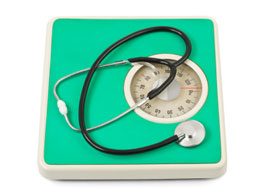8 reasons why you’re gaining weight
Overeating and lack of exercise are obvious explanations for the extra pounds, but there might be a medical reason why you’re gaining weight

Source: Web exclusive, January 2010
Noticing a muffin top spilling over your jeans? How did that get there? While we add pounds because we’re eating too much and exercising too little, weight-gain may also be linked to a medical issue. Here are eight conditions and medications connected to weight gain.
1. The culprit: Hypothyroidism
Your thyroid, the butterfly-shaped gland at the bottom of your neck, isn’t producing enough thyroid hormone’a hormone instrumental in balancing your metabolism. That slow metabolic rate means whatever you’re eating could be stored as fat rather than converting into energy. ‘It’s a very common autoimmune condition that affects women six times more than men,’ says Dr. John Dornan, head of Saint John, NB’s Active Living Clinic.
If your physician suspects hypothyroidism, she might conduct a thyroid stimulating hormone (TSH) test to check how effectively the gland is working, then prescribe a thyroid replacement hormone.
2. The culprit: Oral contraceptives (a.k.a ‘The Pill’)
Most birth control pills contain a combination of two hormones’progestin and estrogen’which prevent ovulation with an almost 99 per cent effectiveness rate when taken correctly. The drawback: Mild weight gain is associated with contraceptives. ‘It’s related to the effect that estrogen has on body fat storage and it probably goes back to our evolution, where women tended to gain weight to nourish the fetus in development,’ says Lorraine Watson, associate professor in the faculty of nursing at the University of Calgary. ‘So if we increase our estrogen, we start messing around with that mechanism.’
Switching Pills might be one solution, since Watson notes that different contraceptives have various side effects. Or you can try a non-hormonal form of birth control such as condoms.
3. The culprit: Antidepressants
Prescribed antidepressants alter the chemicals in the brain to relieve symptoms of depression. While there are different ‘generations’ of antidepressants, Dornan notes that the new and more effective antidepressants, a-typical antipsychotics, trigger weight gain, though it will likely be slight. ‘On average, the gain is mild, but on some people it can be very significant, and in some people, not at all,’ Dornan says.
If you’re on antidepressants or about to start them, make changes in your lifestyle to accommodate potential weight gain, such as exercising more, changing your eating habits and getting enough sleep.
4. The culprit: Type 2 diabetes
If you’ve been diagnosed with type 2 diabetes, it means that your body isn’t producing enough, or is resisting, the hormone insulin. While being overweight can trigger the development of type 2 diabetes, a number of the treatments are linked to further weight gain. ‘Insulin therapy and a number of classes of drugs we use are associated with an increase in weight,’ Dornan says.
Along with advising you to make critical lifestyle changes such as increasing your exercise and eating less, your doctor may also prescribe a drug such as Metformin, which doesn’t increase weight. (However, it’s not a drug that works well for everyone.)
5. The culprit: Cushing’s Syndrome
Also known as hypercortisolicism, this rare condition means there’s too much of the hormone cortisol in the adrenal glands’glands which help regulate blood pressure and metabolism. Symptoms include weight gain (particularly in the upper body, face and neck), fatigue, and high blood pressure and glucose. Cushing’s Syndrome can be caused by a number of factors, including long-term use of hormones for another condition such as asthma, or there could be a non-cancerous tumour causing the overgrowth.
Treatments vary depending on the cause of the syndrome and may include surgery, radiation and taking cortisol-inhibiting drugs.
6. The culprit: Polycystic ovary syndrome (PCOS)
PCOS is a hormonal imbalance that leads to cysts, or sacs filled with fluid in which the egg hasn’t been released in the ovaries. It can complicate ovulation and is linked to weight gain, menstrual irregularities, facial hair growth and sometimes acne, says Dornan. (It’s also associated with insulin resistance, which links it to type 2 diabetes.)
Like type 2 diabetes, treatment options for PCOS include lifestyle changes and medications such as Metformin, which regulates your metabolism and balances your hormones. ‘Sometimes another category of drugs called TZDs’can sometimes treat the insulin resistance of PCOS and help with weight control,’ says Dornan.
7. The culprit: Estrogen
Levels of the hormone estrogen dip dramatically as women reach menopause and beyond. Lower doses of estrogen are connected to menopausal symptoms such as hot flashes and night sweats, for which your doctor may prescribe estrogen replacement therapy. This treatment can trigger fluid retention, a.k.a. water weight. ‘The weight gain would depend on the dose,’ says Watson. “Plus, as a woman ages, your metabolic rate slows down so you’re more inclined to gain weight.’
The only fix with this one is looking once again at your fitness levels and eating habits’as your body moves into menopause, you may have to increase your exercise and decrease the amount you eat to accommodate the changes.
8. The culprit: Steroids
Cortisteroids, used to treat conditions such as rheumatoid arthritis or asthma, generally reduce painful inflammation, but they are also linked to fluid retention. ‘And people tend to be less physically active when they’re on steroids, so they don’t burn as many calories,’ Dornan adds. In the case of rheumatoid arthritis, steroids are used to suppress the immune system. If the steroids you’re taking do cause weight gain and don’t work well in controlling the disease, your physician might look at another treatment. ‘Sometimes we use other immune suppressors that aren’t associated with weight gain, but they have other side effects,’ Doran explains.
Don’t miss out! Sign up for our free weekly newsletters and get nutritious recipes, healthy weight-loss tips, easy ways to stay in shape and all the health news you need, delivered straight to your inbox.




